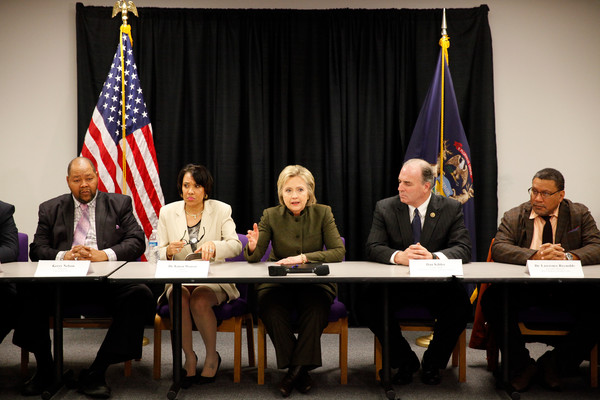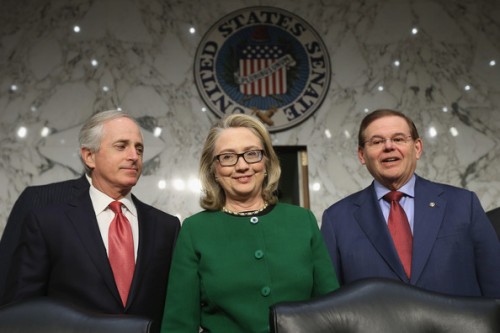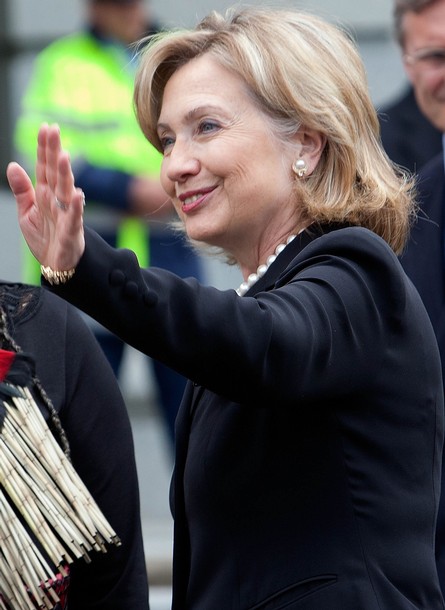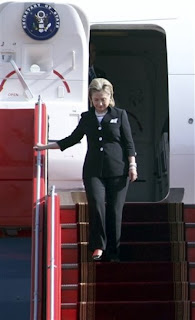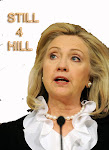Marie Harf
Deputy Spokesperson
Daily Press Briefing
Washington, DC
March 3, 2015
QUESTION: All right. So do you have any insight, then, on why Secretary Clinton used exclusively a personal email account rather than a State.gov or State account?
MS. HARF: Yep. So I just have a few points on that and then I’m sure you have many follow-ups.
QUESTION: Okay.
MS. HARF: So you want me to start?
QUESTION: Sure.
MS. HARF: Great. Unless you had something else.
QUESTION: No, that was – that’s a question. Yeah. That was my question.
MS. HARF: (Laughter.) Okay.
QUESTION: Why is she using a personal account?
MS. HARF: Uh-huh. Well, let’s – I just have a couple points, sort of top lines, and then follow up with many questions, okay?
QUESTION: Okay.
MS. HARF: First, the notion that the Department didn’t have the content of these emails until she turned them over isn’t accurate. A vast majority of them were to or from State.gov addresses or to addressees. So they were obviously retained and captured in that moment. So that notion is just not accurate and I wanted to put that out there first.
A couple other points: There was no prohibition on using a non-State.gov account for official business as long as it’s preserved. So obviously, that’s an important piece of this. When in the process of updating our records management – this is something that’s sort of ongoing given technology and the changes – we reached out to all of the former secretaries of state to ask them to provide any records they had. Secretary Clinton sent back 55,000 pages of documents to the State Department very shortly after we sent the letter to her. She was the only former Secretary of State who sent documents back in to this request. These 55,000 pages covered her time, the breadth of her time at the State Department.
Secretary Kerry is the first Secretary of State to rely primarily on his State.gov account. So what Secretary Clinton did was by no means unusual. In fact, it had been the practice before Secretary Kerry. So certainly, I know there’s a lot of interest in this. I would also point out that the notion that she had this email account is certainly not news; it’s been reported on for more than two years at this point. So I was a little surprised – although maybe I shouldn’t have been – by some of the breathless reporting coming out last night, but I guess that’s the nature of where we are today.
QUESTION: Okay. So just to address one of the things you said. You said there was no prohibition on using —
MS. HARF: Correct.
QUESTION: Yeah, but on – in June 2011, Jay Carney said from the podium, quote: “We are definitely instructed that we need to conduct all of our work on government accounts as part of the Presidential Records Act.” So how do you square those —
MS. HARF: Well, those are different things. That’s the instruction, but there is no prohibition on using a non-state.gov account for official business as long as it’s preserved. That’s in – yes. Let me finish, Justin, and then you can, I’m sure, disagree with what I’m saying and ask more questions. So there was – I mean, the fact is there was no prohibition on this happening as long as it was preserved. I would point out that she has sent in those 55,000 pages. Those are now all part of the permanent record, a vast majority of which already was, given most of it was to and from state.gov addresses.
QUESTION: I’m not disagreeing with what you’re saying. I’m saying Jay Carney —
MS. HARF: I don’t think Jay Carney is disagreeing.
QUESTION: It – well —
MS. HARF: He didn’t say there is prohibition; he said we are instructed to.
QUESTION: He said we’re instructed to conduct all of work —
MS. HARF: Right. He didn’t say there was a prohibition.
QUESTION: — as it applies to the Presidential Records Act.
MS. HARF: Right. He did – first of all – well, first, the White House is different than the State Department. So that’s different; so let’s be clear about that. Secondly, he didn’t say there was a prohibition. No, there are different regulations —
QUESTION: Okay.
MS. HARF: — governing the White House and agencies, Justin.
QUESTION: Okay. So there was no prohibition.
MS. HARF: Correct.
QUESTION: And —
MS. HARF: There wasn’t.
QUESTION: And did she seek any legal counsel on her decision to use a personal email account rather than —
MS. HARF: I mean, you —
QUESTION: — a government account? Because I guess the question would be: Are there security implications for using a private account? How do you manage security on accounts that you don’t control?
MS. HARF: Well, I don’t know. You’d have to ask her. I think, without trying to get into her head on this, she was following what had been the practice of previous secretaries. Again, Secretary Kerry is the first to rely primarily on a state.gov account. This was also an unclassified email; no classified business was done on it. So not going to get into specifics about security, but certainly, this was —
QUESTION: Well, just for the record, we reached out to Condi Rice. She – her – she says that she only used a State account and did not use a personal.
MS. HARF: Okay. Well, I think —
QUESTION: And so I’m not sure that that’s accurate, unless —
MS. HARF: Secretary Rice has repeatedly said that she did not regularly use email.
QUESTION: Okay. But she didn’t – certainly didn’t use a personal email account. And she says when she did conduct —
MS. HARF: I didn’t say she did. I said Secretary Kerry is the first to rely primarily on a state.gov account. Secretary Rice said she didn’t use email primarily.
QUESTION: You said Clinton’s use was consistent with past secretaries of State.
MS. HARF: That’s true.
QUESTION: It wasn’t with Rice’s —
MS. HARF: Well, she didn’t use email. Past secretaries who had used email.
QUESTION: Well, I think she did use email.
MS. HARF: She has repeatedly said publicly, Justin, that she did not regularly use email. Secretary Powell wrote about this in his book that he had a personal computer – I’m going to pick up my notecard here – he had a personal laptop installed in his office so he could use personal email. He wrote about that in his book. So again, there is some past practice for this.
QUESTION: Can I just follow up? So you said one of the claims in this report was wrong because the vast majority went to and from —
MS. HARF: That is correct.
QUESTION: But that still implies that some wouldn’t have.
MS. HARF: That is correct.
QUESTION: And are you confident that all of those are in the records now? Or are there still some that could be floating in the world of dark and unread emails? (Laughter.)
MS. HARF: Well, again, as soon as we reached out to the former secretary, Secretary Clinton provided the emails covering the breadth of her time at the State Department on a wide variety of issues. It’s my understanding that those were provided in that way.
QUESTION: So that’s everything? That’s – we’re talking about the retention act. It doesn’t say “vast majority.” It basically is about all of them. Are you saying —
MS. HARF: Right. We reached out and asked her to provide them. She provided a large amount, those 55,000.
QUESTION: But just say it’s everything if you think —
MS. HARF: Well, how can I – I mean, Brad, I’m not in her email.
QUESTION: Did she say it was everything when she sent it back?
MS. HARF: When she responded, she said this was what she had – is my understanding – that was pertinent here.
QUESTION: Okay. And then —
MS. HARF: Those aren’t exact words, but that’s my understanding.
QUESTION: Is there a prohibition now on using a personal address for government —
MS. HARF: Not to my knowledge, no. The rules as they stand now – and let me just pull this up so I have this – and NARA has continually updated their guidance. The September 2013 NARA guidance is that if an employee uses a personal email account to conduct official business, he or she is instructed to take steps to ensure that any records sent or received are preserved – for example, by forwarding it to an official government account. Those rules have been sent to all State Department employees to make sure they knew that. And again, this is an ongoing process to update records management. As you can all imagine, this is a huge undertaking for an organization as large as ours that actually hasn’t had email for – in the grand scheme of things – all that long.
QUESTION: Marie, can I follow up on that?
QUESTION: You said that – just a couple questions.
MS. HARF: Let’s do – let’s go one at a time.
QUESTION: You said there’s —
MS. HARF: Yep.
QUESTION: — no classified material was sent over this email address? Either received or sent? So she —
MS. HARF: Correct. We have no indication that Secretary Clinton used her personal email account for anything but unclassified purposes.
QUESTION: So the Secretary never received a classified email in her entire span of —
MS. HARF: Well, Secretary Clinton did not have a classified email system. She had multiple other ways of communicating in a classified manner, including assistants or staff members printing classified documents for her, secure phone calls, or secure video conferences.
QUESTION: And then —
MS. HARF: So she certainly had a way of communicating in a classified setting.
QUESTION: Okay, okay.
MS. HARF: Yes.
QUESTION: And can you say – whether or not things are classified, they can also be very sensitive.
MS. HARF: That’s true.
QUESTION: What can you say about encryption or non-encryption regarding her email correspondence?
MS. HARF: Well, I don’t think we’re going to get into specifics of security on a former Secretary’s email, but I can say we have no indication that the email was compromised, the account was compromised or hacked in any way. But again, we’re not going to get into specifics.
QUESTION: Can you say what kind of email address she was using?
MS. HARF: I don’t think I’m going to get into that.
QUESTION: Because if, for example, it was a Gmail account or something like that, technically Google would have ownership over all those communications.
MS. HARF: I don’t think I’m going to get into those specifics.
Yes, Nicole.
QUESTION: I just wanted to follow up on that specific about preservation.
MS. HARF: Yes.
QUESTION: So then as now, it’s okay for a U.S. official to use a non-USG email account, as long as the emails —
MS. HARF: As it’s preserved.
QUESTION: — are preserved. Are there specific instructions on how that should be done?
MS. HARF: Let me see if I have that. And again, a vast majority of State Department business is done on an official system, obviously, so I don’t want to give the idea that State Department employees are regularly not using State Department emails. Let me see if I —
QUESTION: I’m just wondering —
MS. HARF: Go ahead. Uh-huh.
QUESTION: Just wondering if she would’ve had to forward every single email to some State account, or whether it was enough that it was going through State servers. I’m just wondering about —
MS. HARF: So I can check on – of how something needs to be preserved today vice when she was here?
QUESTION: No, I’m asking about her.
MS. HARF: When she was here.
QUESTION: Yeah.
MS. HARF: I can check. There – I do know, though, relatedly, that there was no real-time preservation requirement. The requirement is just to preserve any records that are part of the official record, which she has done by providing them.
QUESTION: Okay.
MS. HARF: And they are all part of the official record. Many of them – a vast majority of them already were, given that they were to or from a State.gov addressee.
QUESTION: Marie, can you —
MS. HARF: And everything is – I mean, if things go back and forth from State.gov addressees, they’re part of the official record.
QUESTION: So they’re preserved —
MS. HARF: Correct.
QUESTION: — and there is no rule against using a personal account?
MS. HARF: Correct.
QUESTION: So that’s why it’s not – I mean, do you believe she’s breached any rule or law or practice known to you or to historians?
MS. HARF: As I said, there’s no prohibition on using this kind of email account as long as it’s preserved. She has taken steps to preserve those records by providing the State Department with the 55,000 pages, so – I’m not a NARA expert, but certainly, it sounds to me like that has been completed.
QUESTION: Except that you wouldn’t really have any way of knowing if she had provided everything, unless you’re just taking her at her word for it, correct?
MS. HARF: I think 55,000 is a pretty big number, and —
QUESTION: (Off-mike.)
QUESTION: I mean, I don’t —
MS. HARF: Okay.
QUESTION: I don’t know how many – I accept that it’s a lot of documents —
MS. HARF: And it covers the time – date – from a date perspective covers the time that she was at the State Department.
QUESTION: Thank you.
MS. HARF: Yes.
QUESTION: Change —
QUESTION: Well, let me follow up.
QUESTION: How do you —
MS. HARF: Who wants to follow up on this?
QUESTION: No, how do you legally verify – I mean, granted, she was the Secretary of State. But as Ronald Reagan said, “Trust, but verify.” Is there any way of corroborating that everything that was provided by her office is in fact everything that she engaged in while she was Secretary of State?
MS. HARF: Look, all I can say is that we reached out to the former secretaries and asked them to provide any records that needed to be preserved. She was the only former Secretary that responded to our request and sent back those tens of thousands of pages of documents. That’s what I can speak to. They cover her time at the State Department. I don’t think I have many more details for you than that.
QUESTION: Are you going to be redoubling efforts with the other secretaries of State, who seem to be remiss in their responsibilities?
MS. HARF: I mean, who knows if some of these secretaries even have records of these things. It’s – this is a – this really is – when it comes to records preservation, this is not something flip to say: The processes have evolved and the regulations have evolved and the guidance has evolved as email has evolved and how technology has evolved, and that’s something we’re constantly trying to do in order to keep up with that.
QUESTION: So – and can you just clarify for – so the Secretary never received a state.gov email, or never used one? I mean —
MS. HARF: I can check. I’m not sure.
QUESTION: I mean, usually when your first day of work, you show up and you —
MS. HARF: I’m not sure the Secretary’s first day of work is the same as —
QUESTION: The payroll tax, and then the email address, and —
MS. HARF: I’m not sure she had a badge. I don’t know. I just don’t know.
QUESTION: Okay.
MS. HARF: I really just don’t know.
QUESTION: (Inaudible.)
QUESTION: Did Clinton’s aides and personal staff also use personal emails to correspond with her?
MS. HARF: About official business?
QUESTION: Yeah.
MS. HARF: I know – I can check on that. Let me see. Well, certainly, State Department employees generally use State email addresses. As would be the case for her aides or anyone else if they did use a personal email, they would still be under the same requirements in terms of preserving that for the record. So I can’t speak to specifics.
QUESTION: Change of subject?
MS. HARF: Anything else on this? Are you still on this?
QUESTION: Yes. I have a few follow-ups.
MS. HARF: Okay.
QUESTION: So one is: You say there was no – at the time in question, 2009-2013, there was no prohibition.
MS. HARF: There’s still not.
QUESTION: Okay. Was there a policy on this point, beyond the NARA guidance? Did the State Department have a policy that addressed use of personal emails for official purposes?
MS. HARF: I can check on that. I know that in August 2013, which is after you’re talking about, NARA issued guidance which included – I’m not sure they had issued it prior to this, but I can check – that email records of designated senior officials are permanent federal records. I’m guessing if they had to clarify that, they hadn’t been clear about it before. I think that’s my understanding. And then in September 2013, they issued guidance on personal email use. So it’s my understanding that’s when NARA, the National Archives and Records Administration that governs this, put the guidelines forward. And then at that point, we sent to all of our employees the guidelines following on that, that they needed to preserve anything that was a record.
QUESTION: Okay.
MS. HARF: So it’s my understanding that those guidelines came later and were not in place at the time.
QUESTION: Okay. So you don’t know of any State Department specific policy that was in place prior to September 2013 addressing this issue?
MS. HARF: Not to my knowledge. I’m happy to check. I don’t want to speak —
QUESTION: Okay.
MS. HARF: — authoritatively on this, but I’m happy to check. But it is my understanding that because NARA didn’t issue those guidelines until late 2013, that’s when we put guidance forward to our employees.
QUESTION: And you mentioned that most of the 55,000 pages were emails to state.gov accounts belonging to other persons.
MS. HARF: A vast majority, yes – to or from.
QUESTION: So in addition to some possibly not going to those accounts – so perhaps not being captured at the time – wouldn’t there be an issue, depending on what kind of record searches were being done, if somebody asked for a search of the secretary or office of secretary emails, and say, she sent it to some other office, office of administration or something – if that wasn’t covered by the search, wouldn’t it be the case that those other emails wouldn’t have been produced? And is the Department doing anything retrospectively to look at either FOIA requests or litigation or congressional inquiries other than the Benghazi one about whether it actually provided a complete production of documents?
MS. HARF: It’s a good question. First, the Department has long had access to a wide array of Secretary Clinton’s records. Emails are only a part of that, whether it’s cables, whether it’s call readouts, other documents. So clearly – and that also included emails between her and Department officials with state.gov accounts. And now we have possession of Secretary Clinton’s emails spanning her time at the State Department. Those are now part of records. So to the extent that FOIA requests come in going forward, if it is determined that Secretary Clinton’s emails may be responsive, if that’s the case, her emails will be searched in connection with those requests. So again, most – we had a large amount of her records to begin with, but yes, all of them will now be searched going forward.
QUESTION: And what about retrospectively?
MS. HARF: That’s my understanding that that will not be happening.
QUESTION: Okay. And has any other – it’s correct that there were 300 pages produced to the Benghazi select panel. Were there productions —
MS. HARF: About – fewer than 300, a little fewer than 300 emails. That’s more than 300 pages.
QUESTION: Okay. Have there been productions from these records to any other panels? And can you say just a little bit about the sequence – was there any connection between those congressional document requests and the decision to send this missive to the former secretaries?
MS. HARF: So the letter actually went before we got the request from the select committee. It went in October of 2014 – that was before we had gotten a request from the committee – as part of our records maintenance upgrading and the process we go through. So that was what drove that. I don’t know the first question answer – I don’t think so – that these have been provided in response to any other request, but I’m not 100 percent sure.
QUESTION: And one final question. You said there’s no indication that there was any classified material. Has the Department done a classification review of the 55,000 pages, and is that the result of it? Or is it just something more cursory than that?
MS. HARF: I don’t believe we have. But we have no indication she used it for anything other than unclassified work, as all of us do on our unclassified State accounts.
QUESTION: Follow-up —
MS. HARF: Anything else on this?
QUESTION: Follow-up this. So does former Secretary Clinton broke the law or not?
MS. HARF: I think I’ve addressed that at length. You can check the transcript for my answer on that.
QUESTION: Thank you.
Read more >>>>











